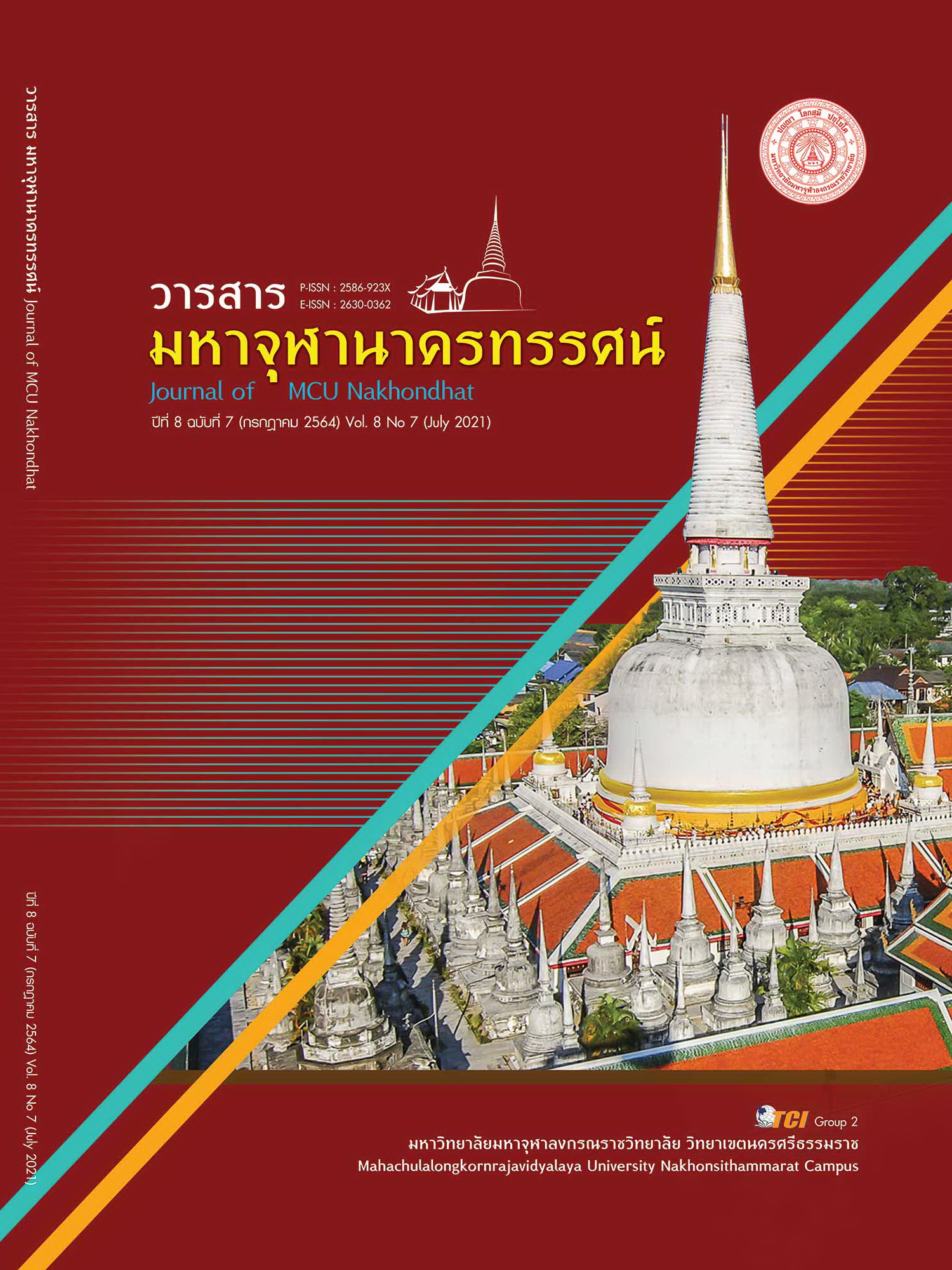THE DEVELOPMENT OF THE HUMAN MIND USING BUDDHIST PRINCIPLES
Main Article Content
Abstract
The development of the human mind using Buddhist principles It helps to change or raise the quality of people for the better. By using the principles of The Four Foundations of Mindfulness Is the mindfulness, determination, physical consideration to see as it is actually only a picture Determined to consider the truthfulness that Is only pity Determine the mind to realize the truth that Is only mental Determine the fairness to realize the truth that Just fair Not an animal Therefore should not hold onto those things Mental management by mindfulness, determining the body in posture Set the breath in and out Called Anapanasati Anapanasati It is important in the early stages of mental development. And the highest in mental development Is to develop wisdom It is a good idea to use. Execute bad thoughts Which in a fair way is called Desire should consider teaching the mind not to get lost in assumptions. Conceived When I began to see the thoughts that arise Contentment and dissatisfaction will fade away. Using thinking in the right way and looking at things and bring it into consideration, investigating, and investigating the reasons for that or to differentiate and analyze with an organized mind Until able to understand and see clearly in that particular thing Which uses the Yonit Somnasikara as consideration to see the lack of substance Or the true insignificance of all things In order to gain knowledge of what should be known Until able to understand and see and manifest in such things According to the reality of nature.
Article Details
References
จิตราภรณ์ วุฒิการณ์. (2563). การเจริญปัญญา. เรียกใช้เมื่อ 3 กุมภาพันธ์ 2564 จาก https://sites.google.com /site/socialbuddhismm6/unit_7/sara_7-2
ชาญวิทย์ ปรีชาพาณิชพัฒนา. (2564). พรหมวิหาร 4. เรียกใช้เมื่อ 3 กุมภาพันธ์ 2564 จาก https://sites.google.com/site/metawatee/hlak-thrrm-thang-sasna/phrhm -wihar-4
นครเยอร์. (2556). ศาสนากับการดำเนินชีวิต. เรียกใช้เมื่อ 2 กุมภาพันธ์ 2564 จาก http://tripopyun. blogspot.com/2013/09/2.html
ปาริชาติ มหาวรรณ. (2557). หลักธรรมพุทธศาสนา. เรียกใช้เมื่อ 3 กุมภาพันธ์ 2564 จาก https://sites. google.com/a/web1.dara.ac.th/social2/sara-na-ru/hlakthrrmphuththsasna
พระเทพเวที (ป.อ.ปยุตโต). (2531). พัฒนาตน. กรุงเทพมหานคร: มูลนิธิโกมลคีมทอง.
พระธรรมปิฎก (ป.อ. ปยุตฺโต). (2542). พุทธธรรม (ฉบับปรับปรุงและขยายความ), (พิมพ์ครั้งที่ 8). กรุงเทพมหานคร: โรงพิมพ์มหาจุฬาลงกรณราชวิทยาลัย.
พระพรหมคุณาภรณ์ (ป.อ. ปยุตฺโต). (2553). พจนานุกรมพุทธศาสตร์ฉบับประมวลธรรม (พิมพ์ครั้งที่ 18). นนทบุรี: เพิ่มทรัพย์การพิมพ์.
สุรเกียรติ บัวแก้ว. (2564). การบริหารจิตและเจริญปัญญา. เรียกใช้เมื่อ 3 กุมภาพันธ์ 2564 จาก http://www. kr.ac.th/el/02/surakeat/05.html
Admin. (2557). การพัฒนาตนเองตามแนวทางพระพุทธศาสนา. เรียกใช้เมื่อ 3 กุมภาพันธ์ 2564 จาก https://sites.google.com/site/sasnakabkardarngchiwit/home /hlak-kha-sxnsakhay-khxng-sasna-phrahmn-hindu/baeb-xyang-kar-thakhwam-di/kar-phathna-cit-tam-naewthang-khxng-sasna
Admin. (2564). การพัฒนาจิตใจ. เรียกใช้เมื่อ 10 มกราคม 2564 จาก https:// discovermerce rcountypa.org /tag/การพัฒนาจิตใจ/


